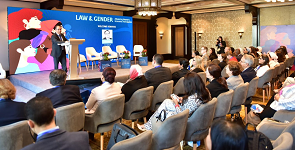The International Finance Corporation (IFC), a member of the World Bank Group, and the World Bank Group, today hosted a summit in Cairo, Egypt on legal reforms and other policy support needed to advance women’s economic participation and legal equality in the Middle East and North Africa (MENA).
The meeting has brought together government, judicial, private sector, and civil society leaders. The MENA region has one of the lowest women labor force participation rates in the world at only 18.4 percent, highlighting gender inequalities in economic security, health, and safety, according to the World Bank. While the region has implemented nearly 200 reforms to expand women’s rights, according to a 2023 World Bank Group study, the gender gap remains wide.
Speakers at the summit highlighted the need for continued legal and public policy reforms, judicial interventions, and programs to close the gender gap and address gender-based violence and harassment. They also reiterated the need for better corporate practices, including parental leave reforms, support for women entrepreneurs, equal pay, and removing restrictions on access to finance and childcare.
“The economic rationale for women’s participation in the workforce is clear and indisputable,” said Ramit Nagpal, IFC Vice President and General Counsel. “We need women at the table – as leaders, entrepreneurs, and employees. All of us, including the public sector, private sector and judiciary have a role to play in breaking down barriers, in employing legal and policy measures to advance women’s participation in the workforce, and in adopting and encouraging best practices even when they are not required by law or policy.”
“Private sector-led development in emerging markets can only succeed with the equal participation of both women and men,” said Emmanuel Nyirinkindi, IFC Vice President of Cross-Cutting Solutions. “IFC is committed to working with the private sector to create inclusive economic opportunities by addressing legal barriers against women and by promoting gender-friendly workplace policies that fully support women as employees and business leaders.”
“Gender is a crosscutting theme in policies related to climate change, food security and science and technology as an essential condition for progress in sustainable development, and these are goals the Government of Egypt embraces,” said H.E. Dr. Rania A. Al-Mashat, Egyptian Minister of International Cooperation.
“I am very pleased that Egypt hosted the IFC’s Law and Gender Conference, with a focus on the interplay between private sector and the judiciary in advancing women’s economic participation, alongside many of my colleagues from the GOE, other governments, and the IFC. Bringing together policymakers, events as such, present the key issues we need to address, including establishing solutions for the increasing socioeconomic repercussions from the pandemic and climate change, as well as committing to accelerating gender equality policies and reform through stakeholder engagement.”
“The key ingredients to advancing women’s economic participation are political will, legal reforms and policies, and most importantly – addressing social norms and behaviors,” said Dr. Maya Morsy, President of the National Council for Women in Egypt. “One of the most important things we can teach our girls is bravery, not perfection.”
“The conference underscores the link between gender parity and economic security and the vital role of national institutions,” said Christopher Stevens, World Bank Group Senior Vice President and General Counsel. “The case for gender equality is clear, and the timing is urgent.”
Gender equality is central to the World Bank Group’s goals of ending extreme poverty and boosting shared prosperity in a sustainable manner. To advance gender equality, the World Bank Group currently has in place a gender strategy that aligns with the United Nation’s Sustainable Development Goal 5, which focuses on four objectives: building and protecting human capital; creating more and better jobs; expanding ownership, control, and management of assets; and enhancing women’s leadership, voice, and agency.
The summit was attended by jurists, government leaders, legislators, regulators, business leaders, economists, and civil society leaders.
Participating leaders in the field of gender equality included Chief Justice Martha Koome of the Supreme Court of Kenya; Justice Mansoor Ali Shah of the Supreme Court of Pakistan; Judge Amal Ammar, Assistant to Minister for Human Rights and Women and Child Affairs for the Ministry of Justice of Egypt; Judge Ihsan Barakat of the Jordan Cassation Court; and Dr. Maha El Said, Professor at Cairo University.

